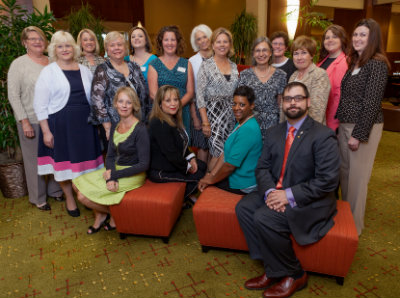 The latest cohort of fellows in Sigma Theta Tau International's Geriatric Nursing Leadership Academy pose for a group photo with their leadership mentors, faculty, and representatives of Sigma Theta Tau and the Hartford Foundation.
The latest cohort of fellows in Sigma Theta Tau International's Geriatric Nursing Leadership Academy pose for a group photo with their leadership mentors, faculty, and representatives of Sigma Theta Tau and the Hartford Foundation.I recently traveled to Indianapolis, home to Sigma Theta Tau International, the honor society of nursing. There I met six very special individuals, competitively selected as fellows in Sigma’s Geriatric Nursing Leadership Academy.
The Geriatric Nursing Leadership Academy aims to prepare and position geriatric-expert nurses as leaders within the interprofessional health care delivery environment. The fellows I had the honor of meeting expressed an unwavering commitment to developing their influence and impact in hospitals, nursing homes, and home health to benefit vulnerable elders.
The John A. Hartford Foundation recognizes that being a nurse today means caring for older adults. At a systems level, nurses need to address clinical processes and services for an older population in order to improve cost and quality outcomes. Yet, clinically expert nurses often need additional preparation and mentoring in order to realize their full leadership potential.
The Geriatric Nursing Leadership Academy is an 18-month, mentored leadership development experience developing leadership knowledge and competence in three domains:
- Individual leadership development
- Advancing nursing practice through leadership of an interprofessional team project
- Expanding scope of influence: organization, community, profession
To date, 46 fellows from 27 states and Canada have participated in the Geriatric Nursing Leadership Academy. Results have been impressive. The Geriatric Nursing Leadership Academy fellows have successfully made sustainable changes in service delivery and have moved into leadership positions that allow for greater ongoing influence. All of the fellows who completed the program have moved up within their organizations.
Fellows have implemented or expanded upon nationally recognized, evidence-based models of care such as NICHE (Nurses Improving Care for Healthsystem Elders), PACE (Program of All-inclusive Care for the Elderly), and models to improve care transitions, including the Care Transitions Intervention and the Transitional Care Model.
Fellows also strengthened the geriatric expertise within their home institutions. For example, Catherine Roscoe Herbert, DNP, APRN, led one of the largest hospital-based efforts to increase the number of nurses with gerontological certification. And fellows influence the field beyond their own institutions. Amy Cotton, MSN, FNP-BC, for example, served as president of the National Gerontological Nurses Association.
This was a group effort for, even in philanthropy, it takes a village. The Geriatric Nursing Leadership Academy was established in 2007 with grant funding from the Hartford Foundation. The Academy is currently supported by our dear colleagues at The Hearst Foundations and Hill-Rom, with previous funding generously provided by The Retirement Research Foundation.
The program, its faculty, and mentoring were made possible with the support of Deb Cleeter of the Sawgrass Leadership Institute and the directors and faculty from the Hartford Centers for Geriatric Nursing Excellence.
Partnerships are key to the ongoing success of this and other Hartford efforts. That’s why we chose to highlight effective funding collaborations in the Hartford Foundation’s 2013 Annual Report.
We need geriatric-expert nurse leaders because—without them—health care won’t meet the needs of our most complex and vulnerable elders. One of my mentors, Mathy Mezey, co-founder of the Hartford Institute for Geriatric Nursing at New York University’s College of Nursing, says that geriatric nurses aren’t born—they are made.
So, too, are geriatric nurse leaders.
